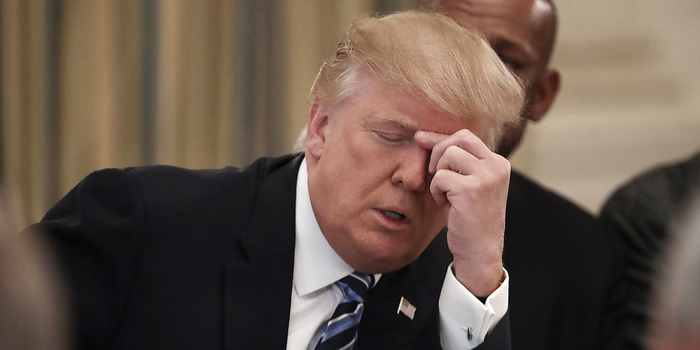Market Sell-Off Deepens as Wall Street Eyes Trump's Economic Strategy
NEW YORK — The U.S. stock market experienced a significant sell-off on Monday, fueled by concerns over U.S. President Donald Trump's economic policies and their potential impact on the economy. Wall Street is increasingly worried about how much economic pain Trump is willing to accept in pursuit of his goals through tariffs and other measures.
The S&P 500 Index fell by 2.7%, bringing it nearly 9% below its all-time high reached just last month. At one point during the day, the index was down by as much as 3.6%, nearing its worst daily performance since 2022, a period marked by high inflation and recession fears.
The Dow Jones Industrial Average also saw a substantial drop, declining by 890 points (2.1%), after recovering from an earlier loss exceeding 1,100 points. The Nasdaq Composite, meanwhile, took a hit of 4%.
This marks the most volatile period for the S&P 500 in recent times, with the index fluctuating by more than 1% in either direction seven times in the past eight trading days. These fluctuations are largely attributed to Trump's unpredictable tariff policies, raising concerns about potential economic damage and uncertainty that could lead to paralysis among U.S. companies and consumers.
Economic Indicators and Expert Opinions
The U.S. economy has shown signs of weakness, with surveys indicating growing pessimism. A widely monitored collection of real-time indicators from the Federal Reserve Bank of Atlanta suggests the economy may already be contracting.
When questioned about the possibility of a recession in 2025, Trump acknowledged a period of transition as his administration aims to bring wealth back to America. He emphasized that these changes require time to take effect.
Trump has stated his intention to revitalize manufacturing jobs in the United States through tariffs. Treasury Secretary Scott Bessent has also suggested the economy may undergo a “detox” period as it reduces its reliance on government spending. Measures such as limiting federal spending, cutting the federal workforce, and increasing deportations could negatively impact the job market.
While the U.S. job market currently demonstrates stable hiring, economists are revising their economic forecasts for the year. David Mericle of Goldman Sachs, for instance, lowered his U.S. economic growth estimate to 1.7% from 2.2% for the end of 2025, primarily due to the anticipated impact of tariffs.
Mericle estimates a one-in-five chance of a recession in the coming year but notes that the White House retains the flexibility to adjust its policies if economic risks escalate.
Chris Larkin, Managing Director of Trading and Investing at E-Trade from Morgan Stanley, highlighted that tariffs are currently overshadowing other market forces.
In response to the market downturn, White House spokesman Kush Desai pointed to significant investment commitments from companies in response to Trump's “America First” agenda, which are expected to create numerous jobs.
Trump recently met with tech industry CEOs in a closed-door event but did not comment on the market sell-off throughout the day.
Impact on Tech Stocks and Consumer Spending
The market turbulence has disproportionately affected major tech stocks and companies that have benefited from the artificial intelligence boom. Nvidia, for example, fell by 5.1% on Monday, bringing its year-to-date loss to over 20%. This marks a significant decline from its 820% surge in 2023 and 2024.
Tesla, led by Elon Musk, also experienced a sharp decline, falling by 15.4% and increasing its loss for 2025 to 45%. The stock has struggled due to concerns about its brand being linked to Musk and protests targeting Tesla dealerships.
Companies reliant on consumer spending have also suffered, with cruise-ship operator Carnival dropping 7.6% and United Airlines losing 6.3%.
Broader Market Trends
The struggles extend beyond stocks, with investors selling off assets like bitcoin, which has fallen below $80,000 from a high of over $106,000 in December.
Conversely, U.S. Treasury bonds have seen increased demand as investors seek safer investments during economic uncertainty, driving prices up and yields down. The yield on the 10-year Treasury fell to 4.22% from 4.32% late Friday, continuing a downward trend since January.
Deals Amidst Uncertainty
Despite the overall market uncertainty, dealmaking activity continues. Redfin's stock soared by 67.9% following Rocket's announcement of acquiring the digital real estate brokerage for $1.75 billion in an all-stock deal. Rocket's stock, however, fell by 15.3%.
ServiceNow also saw a decline of 7.9% after announcing its acquisition of AI-assistant maker Moveworks for $2.85 billion in cash and stock.
Overall, the S&P 500 declined by 155.64 points to 5,614.56, the Dow Jones Industrial Average dropped 890.01 points to 41,911.71, and the Nasdaq composite fell 727.90 points to 17,468.32.
European markets largely mirrored the negative sentiment, while Asian markets experienced mixed results. Chinese markets showed weakness, with consumer prices falling for the first time in 13 months, indicating persistent demand issues.

